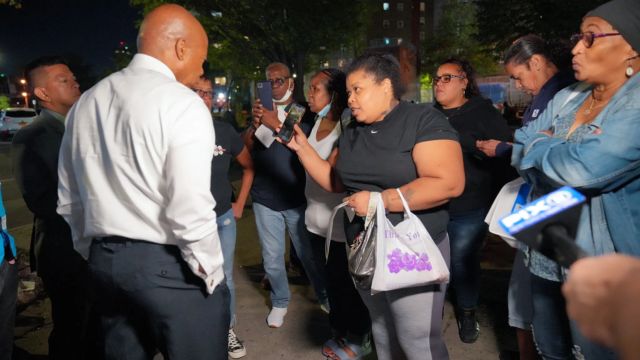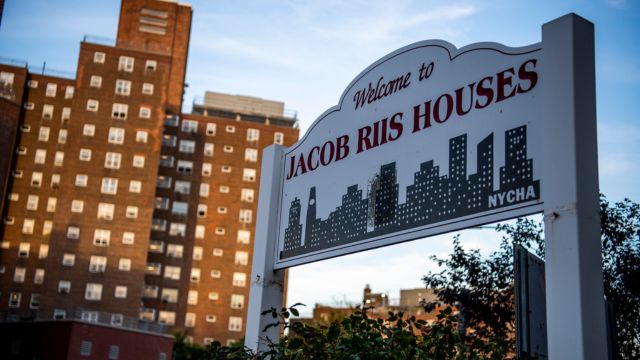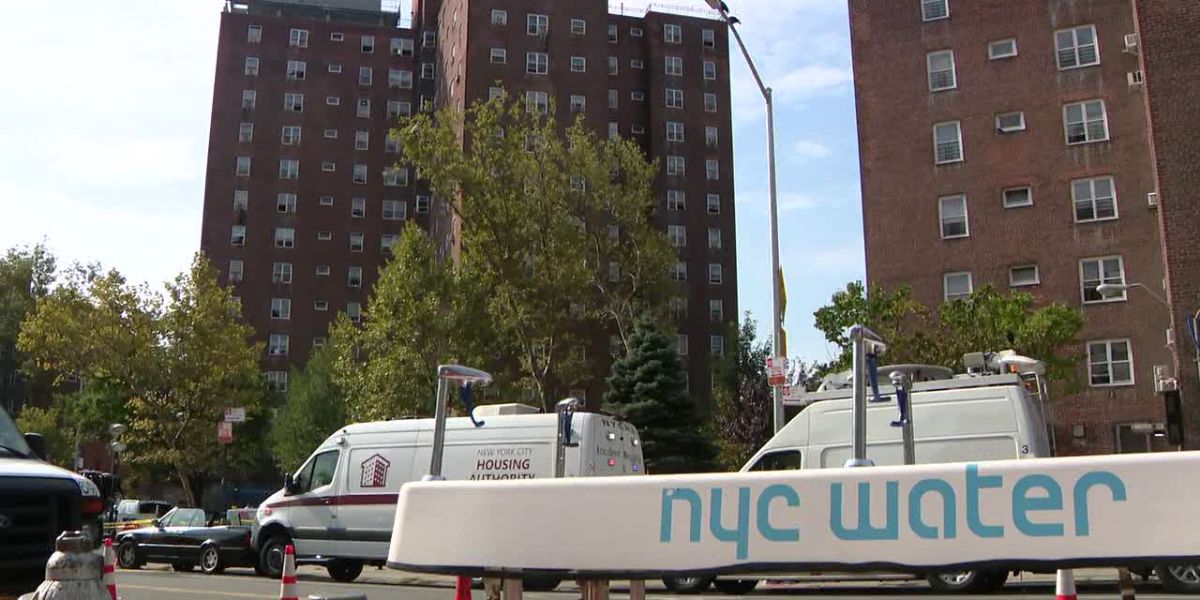What Is The Present Scene? Arsenic Panic Exposes Multiple Failures Within NYCHA, Probe Concludes
DEBARYLIFE – According to twin investigations by the federal monitor for the New York City Housing Authority and the city Department of Investigation, a series of bureaucratic errors led to the 2022 fiasco over the ultimately disproved tests that claimed arsenic was in the water at the Jacob Riis Houses and cost taxpayers nearly $500,000 in “unnecessary costs.”
Tenants had been complaining for weeks about cloudy water coming out of their taps. It all began with a low-level NYCHA manager’s failure to pay a vendor on time to fix a water pump. From there, it escalated to a poorly coordinated effort by top management to order tests for potential contaminants at Riis.
DOI Commissioner Jocelyn Strauber detailed a “poor ad hoc response” to the situation in a 51-page report that was made public on Thursday. She also offered 23 suggestions to strengthen NYCHA’s investigation into tenant complaints regarding possibly tainted drinking water.
“The report indicates quite clearly that there were a series of mistakes in this case,” Strauber stated to THE CITY. “It is not possible to handle contaminated water issues on an as-needed basis. Water tanks are tested by NYCHA. There are no established protocols in place for handling unanticipated water-related issues.
Strauber observed that the 4,000 tenants of Riis suffered as a result.

The joint investigation discovered that NYCHA slowed down the process by failing to request a 24-hour turnaround, failed to instruct the vendor on what to test for, failed to obtain a second opinion from a different vendor to confirm the first vendor’s findings, and failed to confer with city health and environmental agencies to determine what to test for. As a result, notice was given to the mayor and occupants of NYCHA only 16 days after the initial test revealed possible arsenic at Riis.
SEE MORE – Less Crime! NYPD Introduces Drones As ‘First Responders’ In Emergency And Shooting Cases
According to the DOI report, “although NYCHA made an effort to promptly address the perceived public health issue, the agency’s inability to properly determine the cause of the water problems, exacerbated by the erroneous test results, caused NYCHA to incur nearly $500,000 in needless costs and caused unquantifiable stress for residents at the Jacob Riis Houses.”
According to DOI estimates, in all, NYCHA spent an additional $482,506 on the 2022 arsenic scandal. This amount included payments for bottled water that were given to tenants, $336,000 for overtime, and several $200 payments made to Riis residents to assist them in purchasing bottled water.
The Mayor Is Present
Since the first tests by a NYCHA vendor revealed elevated levels of arsenic in the tap water of some buildings within the sprawling 4,000-tenant development that sits on what was once a 19th-century manufactured gas plant on Manhattan’s Lower East Side, the matter of arsenic in the water at Riis has been contentious. This was on the eve of Labor Day weekend in 2022.
As soon as he arrived, Mayor Eric Adams assisted in distributing bottled water. After telling tenants not to drink the water or take showers for a week, NYCHA abruptly changed its mind and declared that the testing company’s first findings were incorrect. The expected uproar set off a series of inquiries into the circumstances that preceded the expensive confusion.

Despite months of repeated testing of roof tanks, the primary sites of water entry, and a representative sample of apartments conducted by NYCHA from August through December 2022, the agency has repeatedly maintained since then that residents of Riis should not be concerned about the quality of their water. Up until last month, the city’s Department of Environmental Protection conducted several independent examinations on the water mains at Riis.
NYCHA’s statement that no detectable quantities of arsenic have ever been found at Riis has been substantiated by every test.
At a recent City Council meeting, NYCHA Chairperson Lisa Bova-Hiatt proclaimed, “There is not and never was arsenic in the water there.” This was in response to Finance Committee Chair Justin Brannan (D-Brooklyn), who brought up a recent Politico article about a Riis tenant who claimed to have high blood arsenic levels. THE CITY revealed in January 2023 that a second Riis person who had high levels of arsenic eventually passed away.
SEE MORE – MTA Bus Struck By Car In Mott Haven Hit-And-Run Incident, What Police Says
Bart Schwartz, who was NYCHA’s outside monitor at the time, teamed up with DOI to investigate the events leading up to that hectic moment on September 9, 2022, immediately after the Adams administration declared the false-positive arsenic test results null and void.
Investigators discovered that beginning in June 2022, tenants in the 13-building complex started to regularly complain to NYCHA about their taps producing murky, occasionally brownish, water.
On July 25, 2022, a new superintendent started working at Riis due to a rise in tenant complaints. The Lower East Side Houses, where the super formerly worked, lacked water tanks. According to DOI, the rookie super did not receive instruction on how to properly maintain water distribution systems and tanks.
The maintenance staff was given “dirty or brown water work order tickets” by the new superintendent, but they kept reporting back that the issues were “unfounded” or “previously corrected.”
According to both accounts, the issue started on July 28 when a Riis maintenance employee discovered that one of Building 11’s two water pumps wasn’t working properly. Seven structures in Riis were supplied by the pumps. The worker also found an open hatch entrance to the roof tank, which was not intended to be there. According to the DOI investigation, NYCHA staff initially thought that this was the reason behind the water’s discoloration.
It is unknown how long this state had persisted because, as the monitor and DOI found, an alarm that should have sounded when a pump failed to function was left off.
The worker asked a vendor who was inspecting roof exhaust fans at the location to take a look at the damaged pump the day he saw it. After the vendor took out the pump to fix it, the employee started the laborious process of obtaining approval from NYCHA supervisors for payment before the repaired pump could be put back in place.
However, the money was withheld because the worker’s supervisor mislabeled the request as a roof exhaust fan repair. The merchant asked about payment on August 8, which was more than a week later. After realizing his mistake, the supervisor who had initially filed the incorrect request for a pump repair submitted it again. The payment was not authorized and the fixed pump was not replaced until August 10.
Because NYCHA took 13 days to pay to have the broken pump serviced, Riis tenants continued to bombard the NYCHA phone center with complaints over hazy water, indicating that mid-level staff members were aware of the problem.
According to the monitor’s report, “With only one house pump operating, excessive air entered the water pipes fed by the tank on Building 11 and caused the water tank level to decrease as residents consumed water but the overworked remaining House pump did not appropriately restore it.”
“Water appears cloudy due to excessive aeration,” the monitor stated.
“Everything” Was Tested
In the meantime, NYCHA was investigating the source of the allegations. The pursuit to discover the answer that followed happened very slowly.
The NYCHA Chief Operating Officer Eva Trimble received a timeline from the inexperienced Riis supervisor on August 12; nevertheless, the malfunctioning water pump was not mentioned. After that, Trimble assigned a subordinate to make contact with American Pipe, the water tank testing provider that NYCHA had been using for many years. It was Friday night, and nobody answered. The underlying then made contact with Liquitech, a different NYCHA vendor that conducts Legionella water tank testing, to test the water at Riis.
SEE MORE – How To Get One Of The Most Famous Desserts In New York City For Just $6
The monitor saw that Trimble failed to seek expedited results, which would have generated test findings in less than a day, and that no one at NYCHA gave Liquitech instructions on what to test for.
According to the DOI assessment, Trimble and other high-ranking NYCHA employees “should have supervised the testing process more closely, including at a minimum, clarifying the testing parameters and ensuring that the water was tested as they intended.”
“There is no evidence that anyone at NYCHA has yet consulted with a water quality or public health expert as to what kind of specific testing would be necessary and appropriately tailored based on the characteristics of the water that had been observed and reported,” the monitor continued.
Rather, the monitor stated that NYCHA routinely communicated to Liquitech that “the water should be tested for ‘everything.'”
Liquitech extracted one sample and mailed it to Environmental Monitoring and Technology (EMT), a lab in Illinois. On August 18, EMT reported a positive reading for elevated arsenic levels in Riis’ water, marking the first time a toxin was found in test findings.
However, it took EMT eight more days to notify Liquitech of that outcome, and Liquitech didn’t notify NYCHA of it until August 29 – eleven days after the initial lab findings showed a positive hit.
NYCHA Decided Not to Alert the Public or Renters at That Point
NYCHA had the option of asking a different vendor to confirm the first finding of arsenic but opted to continue working with Liquitech, which collected samples from six apartments in two Riis buildings on August 30. All tested positive for increased amounts of arsenic the following day, but Liquitech didn’t notify NYCHA administrators of this until September 1. It wasn’t until the following day, September 2, the Friday before Labor Day weekend, that NYCHA informed City Hall.
Following THE CITY’s inquiries about the results that evening, Adams arrived at Riis to hand out water bottles and announce the new “don’t drink the water” advisory.
The DOI investigation also revealed that samples taken two weeks prior indicated the presence of Legionella bacteria in three kitchen sinks and that NYCHA received preliminary results from Liquitech on the same day. However, the NYCHA employee who obtained the Legionella data did not alert executive staff about them until two days later. At that time, the results were not made public or available to renters, even when city environmental regulators questioned the validity of the test.
Two days after tenants were instructed not to drink the water, on September 4, NYCHA hired the LiRo Group as a consultant for the first time. The group collected samples from 95 apartments, Riis’ water tanks, and the main water entry point of one of the buildings where arsenic was detected by EMT’s testing. LiRo announced the following day that findings from 86 samples were “non-detectable for arsenic.”
Mayor Eric Adams sent a news release on September 7th, revealing the Legionella data for the first time and mentioning that further LiRo testing revealed no arsenic and Liquitech turned over their complete results registering Legionella.
SEE MORE – Encouraging News! CNY’s Shootings With Injuries Down By 68% Year-On-Year
The mayor and NYCHA declared the EMT lab results to be fraudulent two days later. While the company is licensed in other places, the monitor and DOI both note that EMT was not authorized to conduct this kind of testing in New York State. The NYCHA informed tenants the following day that it was safe to resume taking showers and drinking water.
Gov. Kathy Hochul enacted laws “to ensure affected residents receive prompt written notice when they should avoid the use of water” at their projects in reaction to this disorganized disaster.
Change Was Needed
Following the terrifying events that occurred in August and September of 2022, DOI reported that NYCHA established an office of water quality and employed contractors who had “appropriate specialized expertise and the necessary qualifications.”
Following all of this, the DOI published a report on Thursday with 23 recommendations, the majority of which were adopted by NYCHA. This entails giving development-level employees more training and mandating that supervisors particularly watch out for a build-up of complaints about hazy water.
The leadership of the authority additionally consented to create a precise procedure that specifies when water-related issues, such as complaints from tenants “about the appearance or condition of the water,” should be reported to NYCHA executives.
Not every suggestion made by DOI was adopted by NYCHA. For instance, DOI stated that while other NYCHA inspectors “are less likely to have a detailed understanding of the system,” certain development water pumps are intended to be assessed by highly qualified workers of the Heating Management Systems Department.
The NYCHA struck this down, stating that the authority is implementing a new system where different employees, from development superintendents to plumbers and electricians, do the task on a rotating basis. The recommendation was for the heating management staff to inspect all water pumps daily.
DOI Concluded on a Positive Note
“NYCHA is in a stronger position to handle a potential or actual water contaminant in the future following the implementation of the policy and procedural recommendations made by DOI and the former federal monitor,” the report said.











